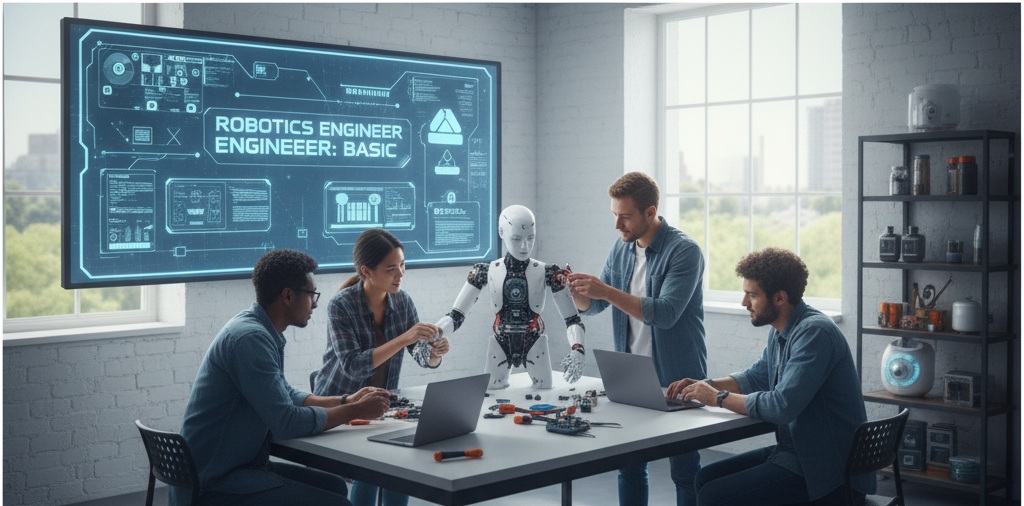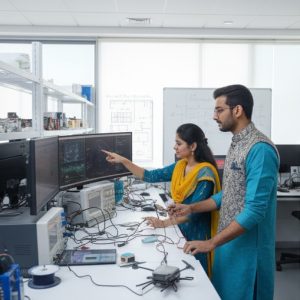Robotics Engineer Course: Level-1
The Robotics Engineer: Course (Level-1) introduces learners to the fundamentals of robotics, including robot design, sensors, actuators, and programming. It covers key concepts such as motion control, automation, and integration with artificial intelligence. Through hands-on activities and practical projects, learners gain skills in assembling, programming, and operating robots for real-world applications. This course builds a strong foundation for careers in robotics, automation, and advanced manufacturing technologies.
- 72 Hours (2 hours/day x 6 days/week x 6 weeks) OR at your own pace
- Hindi, English
- Learn & Get Certified
- Basic & Intermediate
- Hands-On Training


Online Course Fees
Offine Course Fees
About this course
The Robotics Engineer Course: Level-1 Course is a 72-hour introductory program.
It is designed to introduce learners to the core principles, components, and practical applications of robotics.
Through a blend of theory and hands-on activities, learners gain foundational knowledge of electronic components, circuits, sensors, motors, logic gates, and robot mechanisms, while building and troubleshooting multiple robot models on hardware and digital platforms.
The course further develops skills in robot assembly, testing, maintenance, documentation, and Arduino-based programming, enabling learners to construct functional robots such as:
– line followers,
– obstacle avoiders
By the end of the program, participants are equipped to:
– assist in robotics labs,
– support technical operations and
– work as robotics assistant technicians.
Online Course Fees: ₹3500, ₹2500 (incl. GST) (Excluding tools & equipment cost)
Offline Course Fees: ₹15000, ₹12000 (incl. GST) (Excluding tools & equipment cost)
Certification: TCoE
Duration: 72 Hours (2 hours/day x 6 days/week x 6 weeks) OR at your own pace
What you'll learn
After completing this course you will learn:
- Foundations of Robotics – Understand the principles of robotic systems, from kinematics and dynamics to motion control
- Robot Design & Architecture – Explore how mechanical, electrical, and software components work together to bring robots to life
- Sensors & Actuators – Learn how robots perceive their surroundings and interact with the physical world using smart sensors and actuators
- Microcontrollers & Embedded Systems – Get hands-on experience in programming microcontrollers like Arduino and Raspberry Pi to control robots
- Autonomous Navigation – Discover how robots move intelligently using algorithms for path planning and obstacle avoidance
- Artificial Intelligence & Machine Learning in Robotics – Understand how AI empowers robots to learn, adapt, and make decisions autonomously
- Human–Robot Interaction (HRI) – Learn how robots communicate and collaborate safely with humans in real-world environments
- Robot Vision Systems – Explore computer vision techniques that enable robots to “see” and interpret their surroundings
Course Content
Why take this course?
This course provides a strong foundation in robotics by introducing you to the essential concepts of mechanics, electronics, sensors, actuators, and basic programming. You will gain hands-on experience in building and controlling simple robotic systems while understanding how robots perceive, decide, and act in real-world environments. As robotics becomes integral to manufacturing, healthcare, logistics, and service industries, this course is an ideal starting point for learners who want to develop practical skills, spark innovation, and prepare for advanced studies or entry-level roles in the rapidly growing field of robotics.
How to use online TCoE platform?
Tools and Equipment required
National Skill Development Mission
Module-1: Introduction to Electronics
- This module provides the foundational knowledge of electronics essential for robotics.
- Learners will explore basic concepts such as voltage, current, resistance, and power, along with practical understanding of electronic components like resistors, capacitors, diodes, and transistors.
- The topic also covers circuit design, sensors, actuators, and power management, enabling students to build and troubleshoot simple electronic circuits that form the backbone of robotic systems.
Module-2: Introduction of Equipment and Tools Used
This module introduces learners to the legal and regulatory requirements for operating drones safely and responsibly. It covers national and international drone laws, licensing requirements, airspace restrictions, privacy considerations, and safety standards. Students will also learn about compliance procedures and documentation necessary for lawful drone operations. By the end of this module, learners will understand the regulatory framework governing drones, ensuring safe, legal, and responsible flying practices.
Module-3: Introduction to Sensors
This module familiarizes learners with the essential components of a drone and their functions. It covers the frame, motors, propellers, flight controllers, batteries, sensors, and communication systems. Students will also learn how each component contributes to flight, stability, and control. By the end of this module, learners will have a clear understanding of drone hardware, preparing them for assembly, calibration, and maintenance tasks in later modules.
Module-4: Motors and Controllers
This module introduces the principles of drone flight and the forces that govern it. Learners will explore key concepts such as lift, thrust, drag, and weight, as well as stability, control, and maneuvering. The module also covers flight modes, navigation basics, and how sensors like gyroscopes and accelerometers help maintain balance and orientation. By the end of this module, students will understand how drones fly and respond to controls, laying the foundation for practical flying and troubleshooting.
Module-5: Assembling a Robot
This module teaches learners how to operate drones safely using simulation software. Students will practice take-off, landing, hovering, and basic maneuvers in a virtual environment, reducing risks associated with real-world flights. The module also introduces different flight modes, mission planning, and emergency handling. By the end of this module, learners will gain confidence and essential piloting skills, preparing them for actual drone operation.
Module-6: Programming a Robot
Module-7: Testing and Fault Detection
ENROLL TODAY & GET 30% OFF ON ALL COURSES
Your Future Can’t Wait, Enroll Now and Save 30% On All Courses.
Related Courses

Embedded Software Engineer

Fundamentals of AIoT

Fundamentals of Robotronics

IoT Project: Home Automation
See what our students have to say
With over a decade of experience, our mission is to produce future-ready skilled resources.




Autonomous Robot Navigation
Explore how robots think and move on their own! This topic dives into the fascinating world of autonomous navigation, where you’ll learn how robots use sensors, algorithms, and mapping techniques to understand their environment, avoid obstacles, and reach destinations independently. It’s the perfect blend of artificial intelligence, control systems, and real-world problem-solving — bringing robots to life with smart decision-making.
Job Opportunities
Here are some interesting job opportunities after completing the Robotics Engineer Course Level-1:
Robotics Engineer – Design, build, and program intelligent robots for industrial and commercial applications.
Automation Engineer – Develop automated systems that enhance productivity in manufacturing and smart industries.
AI & Machine Learning Specialist – Integrate artificial intelligence into robotic systems for adaptive decision-making.
Robotics Technician – Assemble, test, and maintain robotic components and control systems.
Autonomous Vehicle Developer – Work on self-driving cars and drones that navigate and operate without human control.
Industrial Robotics Programmer – Create and optimize robotic programs for tasks like welding, packaging, and assembly lines.
Medical Robotics Assistant/Engineer – Contribute to the development of surgical robots and healthcare automation tools.
- Research & Development Scientist – Innovate new robotic technologies in academic or industrial research labs.
Frequently asked questions
What is this course about?
In this Robotics Engineer Courses introduces you to the fundamentals of robotics – how robots are designed, built, and programmed to perform tasks automatically.
Who can join this course?
Anyone interested in technology, engineering, or automation can join. No prior experience in robotics is required.
What will I learn in this course?
You’ll learn about robot components, sensors, actuators, control systems, programming, and real-world applications of robots.
Is this course suitable for beginners?
Yes! The course starts with the basics and gradually moves to advanced concepts with step-by-step guidance.
Will there be practical or hands-on activities?
Yes, you’ll work on practical exercises and small projects to build and control simple robots.
What tools or software will I use?
You’ll use basic microcontrollers like Arduino or Raspberry Pi, along with simple programming tools for robot control.

